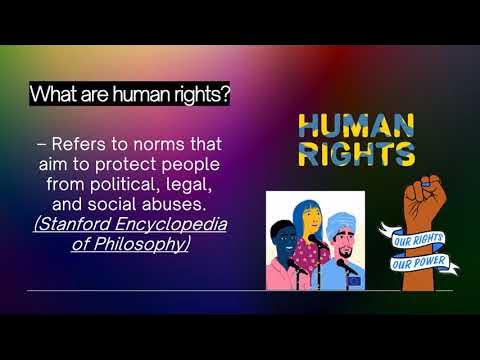Human Rights in the 21st Century | Shami Chakrabarti | TEDxUCL
Summary
TLDRThe speaker passionately defends the fundamental human rights and freedoms that unite humanity, emphasizing their universal importance. They highlight the threats these rights face in the modern world, especially in Europe and the UK, and argue for their protection. The speech covers various key rights, including the right to life, privacy, freedom of thought, and equal treatment under the law. The speaker stresses that these rights are interconnected and cannot be sacrificed for convenience, urging the audience to stand against any erosion of these essential freedoms.
Takeaways
- 😀 Human rights are fundamental and universal, binding all of humanity together, and are essential to preventing war and barbarism.
- 😀 Despite being hard-won, human rights are under constant attack in many parts of the world, including the UK and Europe.
- 😀 The Universal Declaration of Human Rights, agreed upon by a diverse group of people after World War II, serves as the foundation for civil society and its values.
- 😀 These rights include the right to life, protection from torture, the right to a fair trial, and protection against arbitrary detention.
- 😀 The right to privacy is increasingly important in the digital age, balancing security concerns with individual freedoms.
- 😀 Privacy cannot be absolute, but without it, life would lack intimacy, dignity, trust, and other interconnected rights.
- 😀 Freedom of thought, conscience, and religion is a vital human right, especially in a diverse society where different beliefs must be respected.
- 😀 The right to free speech is essential to democracy, even though it may sometimes be controversial or offensive.
- 😀 Freedom of association and equal treatment under the law (non-discrimination) are crucial in protecting human rights and promoting empathy.
- 😀 Empathy is the key to equality and preventing abuses like slavery, torture, and the erosion of freedoms.
- 😀 The most important human right is equal treatment under the law, as it ensures that all other rights are respected and protected.
Q & A
What is the core message about human rights in the script?
-The core message of the script is the importance of universal human rights, freedoms, and the values that protect human dignity. The speaker emphasizes that these rights are fundamental to society and should be upheld for all individuals, regardless of background or status.
How does the speaker describe the origins of human rights?
-The speaker refers to the origins of human rights as stemming from a post-World War II consensus, forged by people who had lived through the horrors of events like the Holocaust and the Blitz. This generation recognized the necessity of certain universal rights to prevent humanity from descending into barbarism and war.
What specific rights does the speaker emphasize as essential?
-The speaker emphasizes the right to life, protection from inhuman treatment, the right to a fair trial, the right to respect for private and family life, freedom of thought and religion, freedom of speech, and freedom of association. These rights are essential for a functioning, democratic society.
What does the speaker say about the right to privacy?
-The speaker highlights the importance of privacy, noting that it is increasingly a frontier issue in the digital age. Privacy is necessary for intimacy, dignity, and trust, and the speaker warns against excessive surveillance that compromises individual freedoms.
What is the speaker's stance on government surveillance?
-The speaker is critical of excessive government surveillance, warning that it could lead to a life devoid of privacy, intimacy, and dignity. The speaker likens it to having cameras and microphones planted in personal spaces, which would undermine trust and other fundamental freedoms.
What does the speaker say about the balance between privacy and security?
-The speaker acknowledges that privacy cannot be absolute in a society and that some compromise is necessary for security, community, and other societal needs. However, they stress that too much compromise on privacy leads to a loss of rights and freedoms.
Why does the speaker believe equal treatment under the law is the most important right?
-The speaker believes equal treatment under the law is the most important human right because it is the foundation of empathy and fairness. If people were treated equally, other rights such as freedom from torture, freedom of speech, and the right to a fair trial would be better upheld.
What role does empathy play in human rights, according to the speaker?
-According to the speaker, empathy is central to the protection of human rights. If people practiced empathy, there would be no need for laws protecting individuals from torture, slavery, or unjust treatment. Empathy encourages treating others as one would wish to be treated, preventing abuses of power.
How does the speaker address the idea that people who have nothing to hide should have no fear of surveillance?
-The speaker challenges the idea that individuals with nothing to hide have nothing to fear, arguing that excessive surveillance, even if not immediately invasive, can erode privacy and dignity. They emphasize the danger of living in a society where privacy is compromised for security.
What is the speaker's conclusion about the importance of human rights?
-The speaker concludes by reiterating the importance of protecting human rights and freedoms, warning against giving them up or treating them as unnecessary. They express a firm belief in the value of these rights and the need for society to defend them, both in the UK and worldwide.
Outlines

このセクションは有料ユーザー限定です。 アクセスするには、アップグレードをお願いします。
今すぐアップグレードMindmap

このセクションは有料ユーザー限定です。 アクセスするには、アップグレードをお願いします。
今すぐアップグレードKeywords

このセクションは有料ユーザー限定です。 アクセスするには、アップグレードをお願いします。
今すぐアップグレードHighlights

このセクションは有料ユーザー限定です。 アクセスするには、アップグレードをお願いします。
今すぐアップグレードTranscripts

このセクションは有料ユーザー限定です。 アクセスするには、アップグレードをお願いします。
今すぐアップグレード関連動画をさらに表示

¿Qué son los Derechos humanos? - Bully Magnets - Historia Documental

The Story of Human Rights Documentary

Vídeo Aula 9º ano Os crimes de guerra, a ONU e a Carta de 1948

Peace and Human Rights Concepts

What are human rights and why do they matter? An animated explainer

Universal declaration of Human Rights International Law explained
5.0 / 5 (0 votes)
